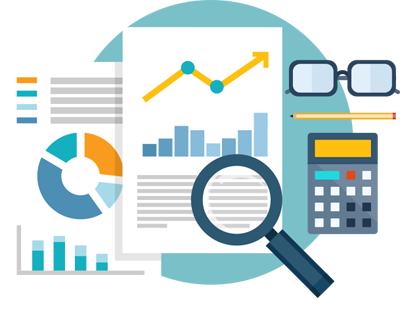If you want to succeed online, it’s critical to track and measure customer behavior. Analytics lets you see what’s working and what isn’t, so you can make informed decisions about your website and digital marketing campaigns. However, Analytics data can be complex and difficult to interpret. That’s where our analytics services come in. We can help you set up effective tracking systems to collect the data you need to make informed decisions about your online strategy. We can also provide customized reports and analysis to help you understand what the data means and how you can use it to improve your business. Our team of experts will not only set up tracking, but also make sense of the data so you can take actionable steps to improve your online performance. Contact us today to learn more about our Analytics Tracking and Measurement Services.

As a certified Google Analytics Partner, we offer a range of services to help businesses make the most of their Analytics data. We can help you set up Analytics, interpret your data, and take action to improve your online performance. Our Google Analytics Micro Services include:
We can help you set up Analytics and ensure it’s configured correctly to collect the data you need. Whether its a simple implementation or more complex setup, we can help you get started with having the right tracking setup.
Analytics advanced filters let you view your data in more meaningful ways. We can help you set up advanced filters to ensure you’re only collecting the data that’s relevant to your business.
Cross device tracking, also known as cross-device tracking or cross-platform tracking, is the process of tracking a user’s journey across multiple devices or domains in a single analytics property. This is important because it allows businesses to see the complete customer journey, even if users switch devices or move between domains. There are several ways to set up cross device tracking, but the most common is to use Google Analytics User ID. We’ll help you track customer behavior across devices and domains.
Google Tag Manager is a free tool that allows you to easily add, update, and manage your website’s tags. Tags are small pieces of code that are used to collect data about your website visitors. They’re used for things like analytics, marketing, and advertising. Google Tag Manager makes it easy to manage your tags without having to edit your website code. You can add, update, and remove tags without having to go through your development team. This saves time and makes it easy to keep your tags up-to-date. Google Tag Manager is a powerful tool that can help you collect the data you need to improve your website’s performance.
We’ll help you set up and manage your Google Tag Manager account so you can easily add, update, and remove tags. This includes creating & tracking custom events.
For a modest fixed monthly fee, we can take care of all your Analytics account management. This includes verifying your initial Analytics setup, regular monitoring of your Analytics account to ensure data is being tracked properly, linking your Analytics with other products as a Google webmasters, and Google Ads, and regular reporting in form of meaningful Insights. You’ll get regular reports and analysis to help you understand your data and take action to improve your online performance.
Custom segments let you isolate and analyze specific subsets of your Analytics data. This is useful if you want to drill down into the details of how a particular group of users interacts with your site. We’ll help you create custom segments so you can better understand your data.
Micro Conversions – Micro conversions are the small actions taken by users on your website that indicate interest in your product or service. They’re generally lower-level actions than macro conversions, but they’re important nonetheless. Examples of micro conversions include -signing up for a newsletter, or adding an item to a shopping cart.
Macro Conversions – Macro conversions are the big, important actions that users take on your website. They’re the actions you really care about because they indicate a high level of interest in your product or service. Examples of macro conversions include – purchasing a product, signing up for a service, or submitting a lead form.
Analytics is important for understanding both micro and macro conversions because it can help you see the complete customer journey. By understanding how users interact with your site, you can take action to improve your online performance. We can help you identify both micro and macro conversions so you can optimize your campaigns.

At Serpsrank, we don’t just set up a tracking system for businesses and leave them to figure out the rest. We know that most businesses don’t have the time or expertise to determine what metrics they should be tracking. That’s why we offer measurement planning services. After thoroughly understanding their business model, we help businesses identify what they should be tracking and how they can make best use of Analytics to drive Business growth.
This allows them to focus on the metrics that matter most to them and enables businesses to make better decisions, enhance their product offerings, and improve their bottom line.
By taking a comprehensive approach, we ensure that businesses are getting the most out of their digital efforts. Our Measurement Planning services are a savior to businesses who want to make the most of their Analytics data. We take the guesswork out of Analytics and help you use data to drive real results. If you’re ready to take your online business to the next level.
We have the expertise to help you set up advanced tracking systems and make sense of complex data.
Our services are cost effective and affordable for businesses of all sizes. With us, you spend less on marketing.
We provide a one-stop shop for all your analytics needs. Finally have the freedom to grow your business.
We help you drive tangible results by taking actionable steps to improve your online performance.
Google Analytics is a free tool from Google that helps you identify trends and patterns in visitors data. You can use it to learn things like how many people are visiting your website, where they are coming from, what pages they are visiting, and how long they are staying on your site. It’s a great way to get a snapshot of how your website is performing, and find ways to improve it.
There are many benefits of using Google Analytics to track traffic and user behavior on your website. By understanding how users interact with your site, you can make changes that improve the overall user experience and increase conversion rates. Additionally, Google Analytics can help you better understand which marketing campaigns are effective and which ones need improvement. Ultimately, using Google Analytics can help you Boost ROI for your website, blog or app.
Google Analytics won’t directly help you with your SEO efforts. However, the information you can glean from Google Analytics can help you indirectly improve your SEO by giving you insights into what areas of your website need improvement and where you might be able to make some changes that would have a positive impact on your SEO ranking. It can give you a lot of useful insights into how your website is performing and how people are interacting with it.
Google Analytics collects quite a bit of data about users and their sessions statistics. It also collects browser & device information, and users geographic location. While this data can be useful for understanding how users interact with your site, it’s important to remember that it does not paint the full picture. For example, Google Analytics cannot track what happens after a user leaves your site. Nevertheless, it can still provide valuable insights into user behavior on your website.
Yes, you need a privacy policy for Google Analytics. Google Analytics is a powerful tool that can be used to track and report on website traffic. It is important to understand that Google Analytics collects data about your website visitors, including user’s geolocation, Browser and device information. This data can be used to identify individual users and their behavior on your website. That’s why it’s important to disclose your use of Google Analytics in your privacy policy. Your privacy policy should explain how you collect, use, and protect visitor data collected by Google Analytics. It’s also a good idea to tell visitors how they can opt out of tracking by Google Analytics if they don’t want their data collected.
Google Analytics uses a JavaScript code to collect information from websites. This code is embedded on every page of your website, and tracks data such as pageviews, unique visitors, and session duration. This data is then sent to the Google Analytics servers, where it is processed and stored. You can then use the Google Analytics interface to view this data, generate reports, and create goals and conversions.
No, Google forbids the tracking of users by Personal Identifiable Information (PII). All data that Google Analytics collects is anonymous and aggregated. Logged-in Google users who are signed up for web analytics also have their data pseudonymized. That means that the last octet of a user’s IP address is replaced with zeroes in order to protect their privacy.
There are really no limits to what you can track with custom events in Google Analytics. You could, for example, track user actions such as clicking on a specific button, visiting a certain page, or completing a task. You could also track more general engagement metrics like time on site, number of pages visited, or Bounce Rate. The only limit is your imagination! With custom event tracking, you can get extremely granular and detailed insights into how users are interacting with your site or app.
Google Tag Manager (GTM) is a tag management system that allows you to quickly, easily and effectively manage and deploy tags on your website or mobile app. Tags are small code snippets that are used to collect data about your website visitors, such as their browser type, geographic location, what pages they visit and how long they stay on each page. This data is then used to track conversions, remarket to visitors or even gather insights about your audience. With GTM, you can quickly add, update or remove tags from your site without having to edit your code or bother your IT department. Additionally, GTM makes it easy to test how different tags react with one another before you deploy them on your live site. All of this saves you time and ensures that your tags are always up-to-date.